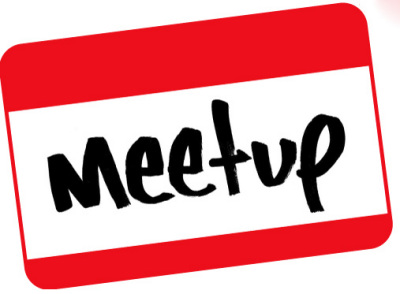
Image: Screaming Monkey/Flickr
Networking is a skill. It’s not just about elevator pitches and icebreakers, however. Place matters. How else are you going to meet the right person at the right time?
The best places to network let you meet people under positive auspices. You share a common cause. You’re there because you want to be, not because you feel like you have to. The premise of the event makes it easy to break the ice. You can come back to these places again and again, making closer connections and building trust. Where are these places, and how do you find them? Here are 25 of the best ones.
Meetups
Browse Meetup.com and find groups that interest you. Then start attending meetups. See which ones you like best. Stick with those and you’ll make connections, guaranteed. Sharing a common interest makes bonding easier than at a deliberate networking event, where connections can be shallow (Meet. Give business card. Follow up. Forget about connection). A Meetup connection, if you stick with it, will be deeper and more involved.
Religious Events

Image: Master Hsin Tao/Flickr
Whether you go to a synagogue, mosque, church, zendo, ashram, or any other belief-based group, you will meet new people at your place of worship. A shared belief system like religion is an incredibly powerful unifying force. It makes you feel like you’re part of a group, tribe or something special. This exclusionary aspect solidifies the bond between members of the belief-based organization. In other words, if you share a religion, it’s easier to trust someone, open up to them, and want to help. Networking under such auspices is ideal.
Exercise
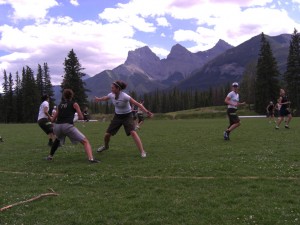
Image: Jon A. Ross/Flickr
Whether you do team sports or individual sports done in a group, like a running club, exercise is an excellent way to get to know people outside of the context of work. Playing together—or, in the case of endurance sports like road biking, suffering together—builds camaraderie and respect between members of the group. Icebreakers and elevator pitches aren’t quite as stressful when you’re sweating with people.
Hobby Clubs

Image: Teo JPG/Flickr
As in, the paper airplane flyers club, the roller skaters’ club, the clubbing club. If you have a hobby, why not see if there’s a local club of people who do the same thing? That way, you can share tricks and tips. You can also find out who they are and what they’re about in the process.
Arts

Image: st0rmz/Flickr
Mingling over creativity peppers fun into the networking process, as well as providing an instant icebreak. This category could include improv comedy, knitting clubs, scrapbooking, life drawing, and any other creative form that you can do with other people. The more conversation and interaction, the better.
Coffee Shops

Image: Stepheye/Flickr
Some coffee shops are hotbeds for million-dollar deals and corporate types. Others are full of creative types. Depending on what kinds of clients (or employers) you’re looking for, you might want to stake out a coffee shop near you that they frequent. Become a regular. Get to know people. Next thing you know, you’ll have an assignment in your lap, along with a bunch of new contacts.
Neighborhood Groups

Image: Nicola since 1972/Flickr
This one can be a little trickier. Although homeowners’ associations and neighborhood watches can be hotbeds of contention and paranoia, you can’t deny that you get to know the people in them when you participate. Whether you like them or not is another issue. A better alternative might be a productive neighborhood project, like organizing a block party, or setting up shared child or pet care between yourself and your neighbors. The key is to be likeable, not like that cretin next door.
Pets

Image: Donnaphoto/Flickr
Love shi-tzus? Joining your local shi-tzu club and fawning over other fuzzy beasts may just be your ticket to getting to know people easily and harmlessly. There are also dog training classes, agility courses, therapy pet associations, or even the good ol’ dog park. It’s hard to have your guard up when you’re being distracted by galloping, wagging, fur-covered animals. Note: This technique is probably significantly harder for people with cats.
Conferences

Image: Boellstiftung/Flickr
A conference is the perfect place to walk up to strangers, get to know them, and swap information speed-dating style. If you’re slower to approach people, giving a presentation or speaking on a panel are good ways to have people approach you. The same is true if you man a booth—they’ll ask you the questions, and you’ll be more visible to everyone. Many conferences also have times set aside for themed networking.
Retreats

Image: Anita K. Hart/Flickr
Retreats throw you into a common area with 5, 10, or 500 people with the same interest or goal. You’re with one another from one day to several weeks. With that kind of intimate setting, it’s hard not to find out who people are, what they can do, and how you might be able to help one another.
Ethnic or Gender-Based Clubs
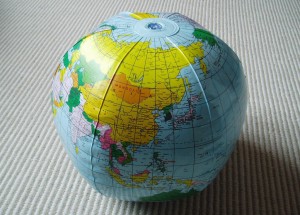
Image: Steve Cadman/Flickr
Often, sharing a common heritage makes it easier to find both common ground and trust. Clubs based on heritage abound, from the Sons of Norway to the Mexican-American Business and Professional Women’s Association. That latter item brings up the second point, which is that gender can also be a common link. It’s probably easier for women to find gender-based clubs and organizations, but there are plenty of official and de facto male organizations out there, too. The bottom line is that you can make easy friends based on who you are and where you came from.
Classes

Image: dcJohn/Flickr
If you’re learning something along with everyone else, breaking the ice almost becomes a non-issue. Maybe you need that person to help you understand a concept, borrow a book or materials, arrange a study group, or lament about the material. Often, the class teacher can also be a good person to network with.
Social Media
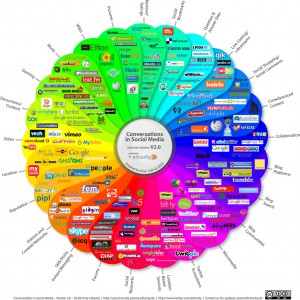
Image: Birgerking/Flickr
Social media can be a mixed bag. On the one hand, you can waste days reading and posting mundane updates. On the other hand, if you link up with the right people and engage your friends or followers, social media can be a gold mine. You can find jobs, business partners, business opportunities, services you need, a dogsitter, and much more. The opportunities are limitless. You just have to approach it strategically and continually engage.
Volunteer Work
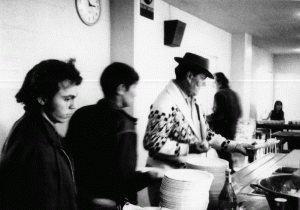
Image: Seattle Municipal Archives/Flickr
In general, people don’t volunteer because they want to be slick or rip you off. Volunteering, rather, comes out of a soft spot, be it empathy, aspirations, or passion for change. A nonprofit or other volunteer event sets a premise based on those feelings. That makes it easier to bond with other volunteers over a common cause, even if your background, religion and politics are polar opposites. The bonus with volunteering is that it makes you feel good, so you’re more likely to be approachable. And you get an overall mood booster, regardless of who you network with.
Alumni Events

Image: Svadilfari/Flickr
High school reunions are debatable as networking opportunities, but alumni events span more than just the old 20-year catch up. College is a good place to start. College alumni events, breakfasts, receptions, alumni sports games, alumni interest groups, and alumni databases are better ways to connect under a common umbrella. You can also give talks at events, making yourself and your pitch more visible.
Trade Shows

Image: ThinkGeoEnergy/Flickr
Trade shows exist in part for networking. They are an easy and obvious place to meet people relevant to your field. If you want people to come to you, man a booth, otherwise spend time exploring other peoples’ stations and networking along the way. The tricky part is staying in touch with people after you’ve dropped your business card. Follow-up emails and social media connections work well for this purpose.
Music

Image: Tuppus/Flickr
Music, whether you play or listen, has a wide array of networking possibilities. From playing in a band to religiously attending certain concerts, from music festivals to the symphony, opportunity abounds for finding people with interests like yours.
Chambers of Commerce

Image: CapeLawOffice/Flickr
Your local Chamber of Commerce probably hosts classes and talks as well as networking events. It’s the kind of place you meet a lot of people and gather a lot of cards. Following up and truly connecting, however, can be a numbers game here. Everyone wants to know everyone, but those quality connections are harder to dig up. Teaching a class, giving a talk, or getting involved with a Chamber effort are better ways to guarantee those close connections.
Associations
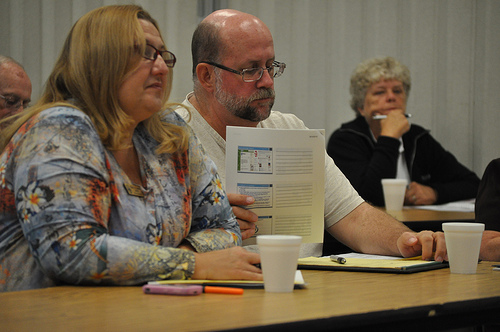
Image: Michigan Municipal League (MML)/Flickr
This category could cover the AARP, the NRA, AOPA, or anything with the word “association” somewhere in the title. Even if the club isn’t exclusive, you share the common bond of membership. In networking, that can be worth a lot. The trick is to attend the association’s events and meet new people.
Leads Groups and Networking Events

Image: Eric Richardson/Flickr
These groups can provide you with a shoebox full of business cards and no contacts if you’re not careful. If, however, you have a strategy in place to follow up with your leads and make them closer connections, leads groups and networking events can be really useful.
Online Forums

Image: Wonderlane/Flickr
Online forums are places to ask questions about and discuss topics of interest. Becoming a regular on a forum, or becoming a moderator, gains you recognition by the other people that frequent the place. This opens the doors for you to get to know one another more personally. Since many people prefer to stay anonymous on forums, this approach requires more persistence than some of the others listed here.
Blogging

Image: kpwerker/Flickr
Blogging can be a fantastic way to get to know people with common interests. You can easily find a community of like-minded bloggers on the web. Acquaint yourself with them by reading their posts and becoming a regular, proactive commenter. Facebook, Twitter and other sources of social media are your friends in this endeavor, too. Before you know it, you’ll be swapping emails and have made new online friends.
Toastmasters
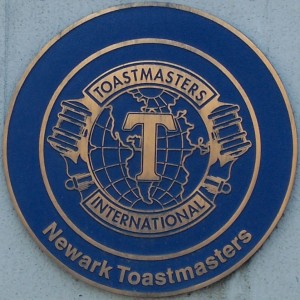
Image: Kevin Collins/Flickr
Toastmasters deserves its own category. Facing one of humanity’s deepest fears, public speaking, with twenty or so of your supportive new friends is an excellent way to network. Everyone’s motivated, and almost everyone is probably scared, too. There are lots of opportunities to share—in fact, it’s part of the program’s template. Networking doesn’t get much easier than this, save for the public speaking part.
Speeches and Talks

Image: Ian Wienand/Flickr
Attending a speech given by your favorite politician, a talk by your favorite author or astronomer, or any other event involving a person you really like standing up and speaking at a podium can be a good networking opportunity. Everyone listens to the same thing and has the same interest. You can chat up people sitting next to you before and after the event. You can approach the speaker after the event and say hi to other people waiting for autographs, for example. (It helps to be outgoing in this setting.)
Where Connectors Are

Image: Hase/Wikimedia
Some people have huge networks. Whenever you mention that you need something, such “connectors,” as Malcolm Gladwell called them in The Tipping Point, will automatically link you up with someone in their network who can help you out. That’s just the way they think. Get to know these people and stay in touch with them. You could find them anywhere, in any club, at any event. Make it a habit to gravitate towards them like they’re lemonade on a hot day.
